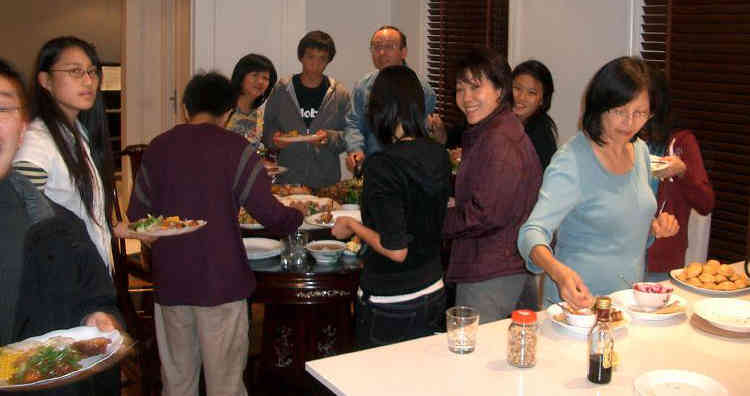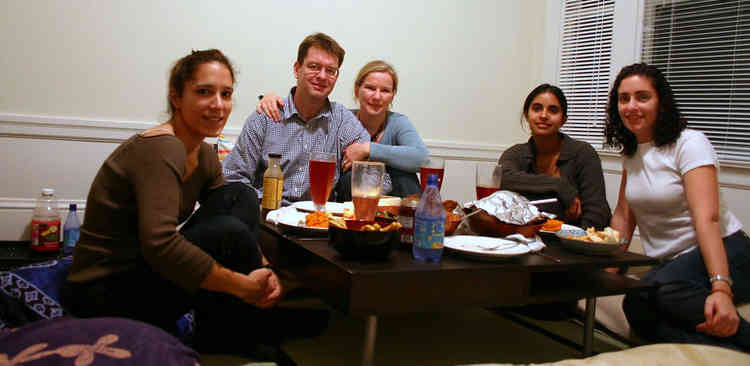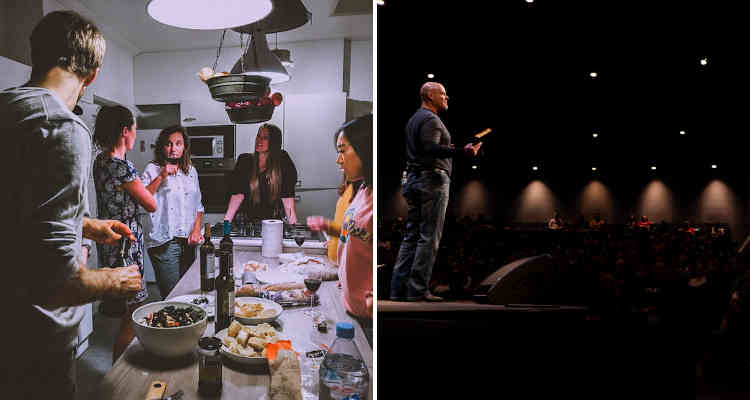A lot of people are saying that, as the world slowly recovers from Covid, churches should NOT go back to what they were doing before. This break in normal church programs is too good an opportunity to lose.
A trending catchphrase is “table, not stage”.
If you want to be part of a better way to do church, read on.
If it is broke, do fix it
There are a lot of reasons to think the old way of doing church needs an upgrade.
Less people attend church services
Church attendance in most first world countries has been in decline for years. The church and christianity are seen as irrelevant by many people. Should we just hope something will change, or should we think of something different?
Too much authority
Our model of leadership needs re-thinking. Jesus recommended servant leadership (Mark 9:35) and Paul recommended shared leadership according to gifts (Ephesians 4:11-12). The authority of a single, “presidential” senior pastor is too great a load for any human being to bear – Jesus is the one head of the church.
Too much authority given to one person can lead to burnout, manipulation, ambition for power and wealth, the scandal of sexual abuse and poor decisions. And to the stifling of the rest of the body ….
Passive consumers, when we need all hands on deck
These days in affluent western societies, many people are money rich and time poor, so the trend seems to be for churches to employ more staff and expect less of the rest of us. But this leads to congregations become more passive and less equipped and experienced in ministry. It robs the kingdom of God and the world of the ministry of so many people, and limits ministry to the few.
The stage robs us all
When we sit in rows facing a stage, we are robbed of fellowship and the contribution of the many – we become performers and audience. Sermonising tends to keep people passive, and we don’t learn well when we’re not engaged.
And our mission is robbed too, as time and resources are devoted to making the Sunday event as slick and attractive as possible, even though this does little to draw people into the kingdom of God or to serve them.
Why the table is important
Jesus did it
Many of Jesus’ important conversations happened around meals. He was notorious for dining with “tax collectors and sinners” (Matthew 9:10-13). When he met up with Zacchaeus, he didn’t invite him to church, but invited himself to Zacchaeus’ house for a meal (Luke 19:5). He also ate with Pharisees (Luke 7:36) and used the opportunity to teach an important lesson as well as give a women new hope in life. And of course his last important moments with his friends was around a Passover meal (Luke 22:11).
The apostles valued the table
Hospitality, fellowship and community are important values in the New Testament – talked about much more than sermons or sung worship if you check it out. Gathering in a circle or around a table are much more conducive to these values than sitting in rows listening. We can see each others’ faces and relate personally. Sharing a meal seems to build community. Hospitality is a great way to break down barriers and welcome new people. And so we see the apostles meeting and eating together regularly (Acts 2:46).
It’s how our brains and emotions work
Human beings don’t learn best by just having information presented to them, and we certainly aren’t inspired that way. We need to hear stories. We need to be actively engaged, not just hearing, but seeing, feeling, talking, questioning. And surprisingly, we learn better off our peers than from experts. Eating together facilitates all this and draws people together as a community or family. A conversation around a table can be personal, even individual, unlike a sermon which cannot possibly address the many disparate needs of an entire congregation. Conversation may seem less efficient, but it is more effective.
Working as a team
Sharing together enables the collective wisdom and gifts of the group to be brought to bear on the matters at hand, whether this be learning, planning or being encouraged. We’ll learn better, are more committed to action and better prepared for ministry. Around a table, everyone is equal.

Replacing the stage with the table
I have come across many ways we can make a positive difference to the mission of the church, and many of them involve tables – both meal tables and coffee tables.
Note: many of these churches have had to temporarily change their meeting style because of Covid, but below I describe their pre-Covid meetings.
1. Occasional variations on regular church
Some churches still do regular church some weeks, but other weeks they do dinner church.
- A Chicago church holds regular church services 2 or 3 times a month, but meets two Sundays a month in homes, where they share a meal and participate in a liturgy that includes prayers, readings and the Lord’s Supper. They find this to be community building.
- Once a month, a UK church has its service as a family-friendly dinner in a school hall. There’s a short reflection on a Bible passage, some discussion, and prayer, and there are toys for the kids to play with.
2. Church meets around tables all the time
- A US church meets around dinner, Sunday and Monday evenings. Dinner Church attendees help prepare the meal when they arrive, and clean up at the end. They sing, tell the stories of Jesus and of their own lives, they follow an ancient liturgy with prayers, singing and Eucharist. Every second Sunday morning there is also Waffle Church, in which children and adults share equally.
- This church in Belfast meets around tables every week. The services seem to be more or less conventional, but their home groups meet around meals. And once a month on a Saturday evening there is a meal and story gathering for women.
- Twenty years ago we participated in a Sunday evening cafe church in Sydney We met around tables, shared a home-cooked meal, listened to each other’s stories and learnt from the Bible through video. Because many participants were part of 12 step groups, we developed our own 12 steps of spiritual growth which hung on the wall each week as a reminder.
- Coffee Shop Sunday meets each week in a (you guessed it!) commercial coffee shop in a UK city. There is music, story telling, prayer and conversation in this growing and enthusiastic community, with an occasional guest speaker.
- This church in Seattle was in decline until they tried something different, and something ancient. They re-organised around “a meal, music and message” in ten locations. The Dinner Collective, which this church commenced, now meets in 300 locations around the world, mostly on the US, but also in Australia, Africa and Europe.

3. “Mixed economy” church
Some churches provide opportunities to choose either conventional church or church around a table.
- This church north of Sydney, Australia provides several different types of meetings. One of them, Meeting Ground, is “a home for the spiritual misfits”, and meets around meals. “Our heart is to create an environment where people who have barriers against mainstream churches can come and feel safe, feel seen, feel like they can bring along their spiritual trauma or doubts, and go on a journey towards some sort of reconstructed faith.”
- Like many other churches, this church in Portland USA, has regular Sunday services plus midweek community groups sharing meals in homes. They say they want the midweek missional communities to be seen as the primary church.
4. Missional communities
Some churches and groups build their meetings around being missional – including a majority of their members from the surrounding community.
- This network includes more than half a dozen missional communities, which meet in pubs, clubs, cafes and other public places in a coastal community south of Sydney, Australia. The emphasis is more on coffee than meals. They meet around tables and share life and discuss the Bible. And as they emet week after week in the same time and place, they gradually interact with the other patrons. More than half the attendees were not believers when they joined the groups.
- The Underground in Florida supports 200 small missional communities, each meeting the needs of a particular demographic. They meet in all sorts of places, but some meet in homes over meals.

It could be you …. or me
Moving from the stage to the table can happen at any level, from a large church to a small home group. It’s more natural and familiar in the home, but it can be done in church. Church in a Circle blog offers some ideas for this.
This move from stage to table seems to be a move of the Spirit, to further release Jesus’ church to minister into the world using all of its gifts and all of its members. It’s not the only way to do things, but it’s a good way. Do you want to be part of this?
Read more
- Dinner church, anyone? Mike Frost.
- From stage to table – why we urgently need to re-think church in 2021. Craig Greenfield.
Photos: Top: Lisa on Pexels and Mariah Solomon on Unsplash. Other photos: Alpha on Flickr, Kai Schreiber on Flickr, fauxels on Pexels.




Hi Eric, we’re just on the bus heading back to Canberra.
I’ve just finished reading your article on the bus. I didn’t see this until after we caught up, I thought that was good timing.
Considering that we were talking about small groups this afternoon 🙂
I think it’s definitely good to see that this is being explored in different church communities during Covid too. It’s good there are some movements in Australia. I think this is also what the early church did together as a community which also included sharing meals together.
Kind regards, Ryan
Also, not sure why it said I posted the above message at 8:51am, when it was actually in the afternoon sometime after 5pm I posted 🙂
Hi Ryan,
Sorry not to reply earlier. WordPress used to advise me when a comment was posted, but it isn’t happening reliably at the moment, I’ve still got to find out why.
Yes, I think things are changing in many churches. Covid and dropping numbers and weakening engagement are all having an effect. I believe and hope that the Holy Spirit is behind it all.
The posting time may not be EST, I don’t know, we’d need to experiment. Or it may be that the server in the US takes a while to update.